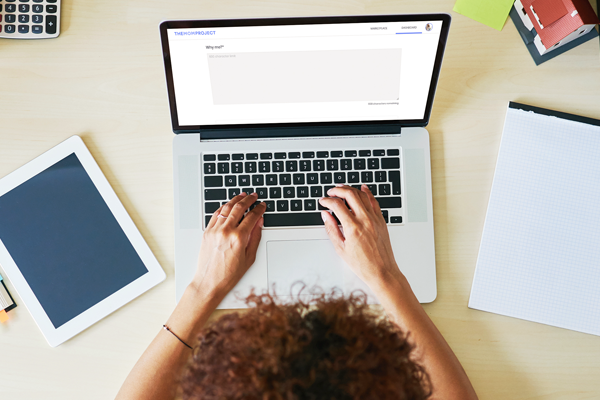Learn how to shine in your next phone interview.
Since you don’t have to worry about all of the extra details a face-to-face meeting requires, a phone interview can feel less important—but that’s simply not true. Phone interviews are often used as “screeners” to narrow down a large number of seemingly qualified applicants into a short-list of vetted candidates, so this is your chance to let your personality and experience shine.
Likely, your resume stood out to the hiring team and now they’d like to learn a little more about you and your interest in the role to determine if you should move forward in the interview process. It’s common to have a recruiter or a member of the company’s HR team conduct the interview at this stage rather than your potential boss or hiring manager.
Making sure you're prepared for your phone interview will help you stand out from the crowd—and ultimately score that next interview!

Find the right location
First, you’ll want to find a quiet place where you can focus on the interview questions, craft thoughtful responses and take notes. Whether you are taking the call from the comfort of your own home, a coffee shop or a conference room, make sure there is minimal background noise and a good signal so that the interviewer can hear you clearly.
Hardwood or tile floors in unfurnished spaces (like a basement or bathroom) can cause an echo that can make it hard for the interviewer to understand you, so you may want to do a test call ahead of time.
Remove all distractions
Once you have secured a location for your call, make sure to turn off any alarms or toys nearby and put your phone’s notifications on Silent Mode (after you have answered the interviewer’s call, of course.) Headphones can also help minimize distractions and reduce background noise if you’re comfortable wearing them.
If you’re taking the phone interview from home, make sure you let your family members or roommates know that you’ll need quiet and privacy during this time. Ask them to avoid any loud devices like TVs, electronic toys or tablets until after you have completed the call. Worried about surprise distractions? Let the interviewer know at the start of your interview that you’re at home and have made every attempt to keep them at bay but distractions may happen.
While you should make every attempt to accommodate the interview time, let the interviewer know as soon as possible if the suggested times conflict with your schedule (childcare or otherwise) and provide your availability as soon as possible.
Be prepared
Whether it’s the first round of the interview process or at a later stage, a phone interview is just as important as any other interview—no matter who you are speaking to. The recruiting coordinator, HR manager or any other member of the hiring team all have a say in the process, and you can’t move forward if you don’t make the cut.
If this is your first interview for the role, the interviewer will likely ask basic questions about your work history, interest in the opportunity, career goals and availability as well as give you more details about the position itself.
Think of it almost like a checklist; the interviewer wants to know that their needs and wants are aligned with yours.
Before your phone interview, think about any questions you may have for the interviewer and practice your personal pitch. You should be able to succinctly explain your experience, interest in the position and why you’re a great candidate for the role.
Read through the job description and think of specific personal examples that relate to the experience, hard skills and soft skills that they are looking for. Writing these out on a printout of the job description can be a great exercise before the interview, and you can use this as a “cheat sheet” during your phone interview! Also keep in mind that the HR manager may know more technical aspects of the role, so be prepared to talk about your technical qualifications if it comes up.

If you don’t have specific examples to share for a few of the job description bullets, don’t fret. Be upfront about it, explain your interest in developing those skills (including anything you might have done already to do so) and ask about the employer’s willingness to train in these areas.
Talking about your salary requirements
The interviewer may also ask you about your salary requirements, so be prepared to disclose that information. Share a general salary range that you’re comfortable with, even if money is not your number one motive. There’s no need to get nervous here — just like the job itself, they’re asking for this information to make sure you’re both aligned. Neither you nor the company wants to wait until the final offer to realize there’s a large gap in salary expectations.
Questions about salary can be a total toss-up; sometimes they are asked at the beginning of the interview process and other times in the end. If the interviewer doesn’t bring it up and you’re concerned that you may be way out of sync here, it’s okay to ask (just don’t make it your first question).
👉 If the salary is listed on the job description, it’s appropriate to ask what the salary range is to see if there is flexibility in the number listed.
Do your research
Get to know who you’ll be interviewing with by looking up their LinkedIn profile and learn more about the company itself. Take a look at the company's ‘About Us’ page and read up on some of their recent blog posts or news articles. Having a little background information to use during the conversation can be helpful to establish a personal connection and convey your interest in the opportunity — plus, it shows you took initiative.
If you don’t know what company the role is for, your recruiter should disclose that on the call. If you know who they are and what they do—great! Express your excitement. If not, show your enthusiasm to learn more about them.
Be ready for the call
Confirm who is calling who if that hasn’t been explicitly stated, and be ready for the call. You don’t want to miss it. But if for some reason you do (or the connection is lost), call back immediately. Leave a voicemail if they don’t answer and send a followup email right away. If for some unforeseen circumstance you’re in an environment with loud background noise that can’t be corrected — try to reschedule. It’s not going to benefit you or the interviewer to continue when they can’t hear you.
Set up your space
Make sure you have a fully charged phone and check your reception. Have the job description, your resume and any notes printed out (or on a screen that you can easily reference). You don’t want to be fumbling around for these materials at the start of your call. You’ll also want supplies to take notes during the interview, which can be useful to reference for any followup communications.
👉 Have a glass of water, coffee or tea at hand in case your throat gets dry during the interview.
Communicate with clarity and purpose
Speaking out loud before your phone interview can be a great way to shake out your nerves and warm up your vocal cords. This is a great time to practice your personal pitch. Or choose a few lines of something to read aloud (just keep your reading materials upbeat!)
When you answer the phone, say hello and use your first and last name. It’s professional, polite and makes it easier for the interviewer to know they’ve got the right person at the end of their line. And say it with a smile — you want to come across as enthusiastic right from the start!
Interviewing styles vary, so follow the interviewer’s lead — whether they’re looking for a few minutes of casual conversation or want to dive right in.
📖 Read more: How to Answer "Tell Me About Yourself" in an Interview
With phone interviews, it’s important to be clear and concise:
- Be mindful of your enunciation (how clearly you are pronouncing words)
- Avoid rambling answers that can lose the interest of the interviewer by keeping your responses brief but comprehensive
- If you’re typically soft-spoken, don’t forget to project your voice
- If you have a tendency to talk fast when your nervous, slow down
You want the interviewer to be able to understand everything you’re saying and have time to process all the details. Pauses can also be a big help here, and save you from using too many disfluencies (those pesky “ahs”, “ums” and “likes”). Plus, you’ll be able to better avoid the risk of cutting an interviewer off if you take a quick pause after a question (and it gives you a little extra time to process your answer!)
Smile and show enthusiasm
Since the interviewer can’t see your facial expressions or body language on a phone interview, your enthusiasm is key. You might not think it’s a big deal since the interviewer can’t see you, but they actually can hear when you are excited or happy — as well as bored or zoned out. So stay engaged and don’t forget to smile. Your interviewer will feel the positive energy on the other side.
👉 Some people find that looking into a mirror while speaking helps to convey their enthusiasm. You can also try standing up during your phone interview if you need a little extra pep in your step!
Finishing up the interview
If you have any unanswered questions, now is the time to ask. Have your top questions highlighted so you can get straight to those if you only have a few minutes left on the call. Make sure your questions are appropriate for the person you are speaking to and the stage you’re at in the interview process. For example, you wouldn’t ask a recruiter what the promotional timeline for the role is or ask the HR manager about the sales team’s favorite tools. You can also ask about next steps if that hasn’t yet been covered.
At the end of the interview, thank the interviewer for their time, restate your enthusiasm for the role and let them know that you’re interested in learning more about the opportunity.
Say thank you
Follow up with a thoughtful thank you message via email as soon as you can (within 24 hours of your interview is the gold standard.) First-round interviews can move pretty quickly, so you don’t want to miss out on your last chance to leave a positive impression.
In addition to expressing your gratitude and appreciation, you should also use this message to reiterate your excitement for the role and address (or reinforce) any additional points you want to make. But don’t go overboard on length — about 2 to 4 sentences should be enough to get your point across.
If you don’t have the interviewer’s contact information, you can check LinkedIn or send your message to your contact at The Mom Project and we’ll be sure to pass it along.
📖 Read more: Writing the Perfect Post-Interview Thank You Note
Practice (and preparation) pays off
Phone interview complete — you did it! Do a little dance, pat yourself on the back, acknowledge the time and effort you put into the call. Then, take a moment to reflect on what you thought went well and what you might like to work on. Make space for progress with each step of your career search journey. As with most things in life, you get better with practice. And interviewing is no exception.
If you put in the work by taking the time to prepare for and practice your phone interview you’ll be one step closer to success. You’ve got this!
Join our professional member network
Join The Mom Project to access job opportunities with family-friendly employers, career development resources and connect with a network of professionals that value work and family. 



